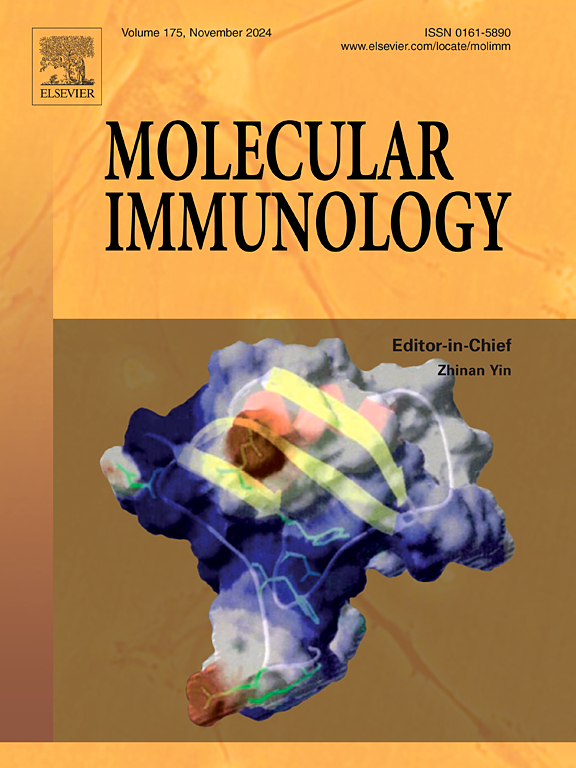阻断PD-L1和LAG-3的新型双特异性抗体的抗肿瘤效果
IF 3.2
3区 医学
Q2 BIOCHEMISTRY & MOLECULAR BIOLOGY
引用次数: 0
摘要
在过去的几年中,在免疫治疗中使用针对程序性细胞死亡蛋白1 (PD-1)及其配体(PD-L1)的抗体取得了实质性进展,并取得了有希望的结果。然而,一些问题仍然限制了它们在抗癌治疗中的有效性。因此,我们设计了一种针对PD-L1和T细胞免疫检查点淋巴细胞活化基因-3 (LAG-3)的双特异性抗体(简称Ba-PL),试图阻断这两个靶点,进一步提高对实体瘤的免疫功效。双特异性T细胞接合器结构用于串联PD-L1和LAG-3抗体的可变区域。采用原核表达系统制备该抗体,并在体外对其分子水平和细胞水平进行亲和力评价。并对其在小鼠体内的抗肿瘤作用进行了初步评价。综上所述,利用原核表达系统制备的抗体具有较好的肿瘤细胞靶向能力,能够阻断PD-1和LAG-3与其配体的相互作用。动物实验结果表明,Ba-PL对4T1和H22荷瘤小鼠具有较好的抗肿瘤作用。总的来说,我们的研究表明,这种策略对肝癌、肝细胞癌和乳腺浸润性癌具有治疗潜力。本文章由计算机程序翻译,如有差异,请以英文原文为准。
Anti-tumor effectiveness of a novel bispecific antibody that blocks both PD-L1 and LAG-3
Over the past few years, substantial progress with promising outcomes were achieved for the use of antibodies against programmed cell death protein 1 (PD-1) and its ligand (PD-L1) in immunotherapy. However, several issues still limit their effectiveness for anti-cancer therapy. Therefore, we designed a bispecific antibody (referred to as Ba-PL) against PD-L1 and T cell immune checkpoint lymphocyte activation gene-3 (LAG-3), in an attempt to block both targets to further improve immune efficacy against solid tumors. A bispecific T cell engager structure was used to connect the variable regions of the PD-L1 and LAG-3 antibodies in series. The antibody was prepared using a prokaryotic expression system, and its molecular and cellular-level affinity was assessed in vitro. Furthermore, we preliminarily evaluated its anti-tumor effects in mice. Collectively, the antibody prepared using the prokaryotic expression system had preferable tumor cell-targeting ability and blocked the interaction of PD-1 and LAG-3 with their ligands. Further, the results of the animal experiments demonstrated that the Ba-PL exerted a better anti-tumor effect in 4T1 and H22 tumor-bearing mice. Overall, our study suggests that this strategy has therapeutic potential for liver hepatocellular and breast invasive carcinoma.
求助全文
通过发布文献求助,成功后即可免费获取论文全文。
去求助
来源期刊

Molecular immunology
医学-免疫学
CiteScore
6.90
自引率
2.80%
发文量
324
审稿时长
50 days
期刊介绍:
Molecular Immunology publishes original articles, reviews and commentaries on all areas of immunology, with a particular focus on description of cellular, biochemical or genetic mechanisms underlying immunological phenomena. Studies on all model organisms, from invertebrates to humans, are suitable. Examples include, but are not restricted to:
Infection, autoimmunity, transplantation, immunodeficiencies, inflammation and tumor immunology
Mechanisms of induction, regulation and termination of innate and adaptive immunity
Intercellular communication, cooperation and regulation
Intracellular mechanisms of immunity (endocytosis, protein trafficking, pathogen recognition, antigen presentation, etc)
Mechanisms of action of the cells and molecules of the immune system
Structural analysis
Development of the immune system
Comparative immunology and evolution of the immune system
"Omics" studies and bioinformatics
Vaccines, biotechnology and therapeutic manipulation of the immune system (therapeutic antibodies, cytokines, cellular therapies, etc)
Technical developments.
 求助内容:
求助内容: 应助结果提醒方式:
应助结果提醒方式:


